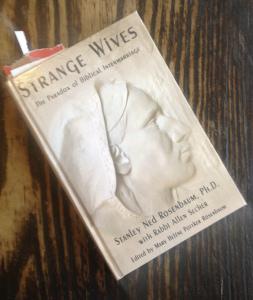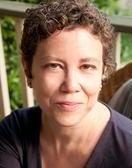
Abraham, Moses, Ruth, David, Samson, Joseph, Esther, Solomon.
What do they all have in common?
They were intermarried.
Thus begins Strange Wives: The Paradox of Biblical Intermarriage, a comprehensive and compelling exploration of the formative effects of intermarriage in Biblical times. This book provides a very readable guide to the history of intermarriage in the mixed multitude of cultures and practices and beliefs coalescing gradually, over centuries and millennia, into the people Israel. The authors conclude that the “early willingness to reach across tribal and ethnic boundaries was a source of strength, which Jews later forgot or chose not to remember.”
Here, I am glad to claim my relationship to the three people who created this long-awaited book. Strange Wives was written by Stanley Ned Rosebaum, with Rabbi Allen Secher, and edited by Mary Heléne Pottker Rosenbaum. Ned and Mary co-wrote Celebrating Our Differences: Living Two Faiths in One Marriage, a groundbreaking chronicle of a dual-faith family. Rabbi Allen was the first rabbi working with interfaith families communities in Chicago. I met Mary, Ned and Rabbi Allen at a series of national conferences to support interfaith families, through the Dovetail Institute.
Ned studied at Hebrew University and the Sorbonne, got his PhD in Near Eastern and Judaic Studies from Brandeis, published scholarly books on Biblical topics, and spent almost three decades as a beloved professor of Jewish Studies at Dickinson College. Then in 2011, he died in a tragic automobile accident, leaving Mary and Allen to get this book out into the world. Which they did, and for which I am very grateful.
As an interfaith child, and an interfaith parent, I have often faced the argument that Judaism has always prohibited intermarriage. This book puts that idea to rest, with deep erudition, wit, and aplomb. Strange Wives is nothing if not thorough, with footnotes, a full bibliography, and plenty of credit given to academics writing on this topic. But this is a book for all of us, with crystal clarity, and lively tone.
Strange Wives draws on both Scripture and archeology to describe the Biblical setting as a cultural caravansary at the nexus of Africa and Europe, and of the Indian and Mediterranean Oceans. The authors document marriages of Israelites with Ammonites, Amalekites, Moabites, Midianites, Samaritans, Canaanites, Amorites, Hittites, Egyptians, and Babylonians. The women who married into the tribes of Israel continued to worship their own fertility gods even after marriage, and early Israelite farmers continued to appeal to fertility gods to bless their crops, and saw their God as competing with, incorporating, subsuming, and possibly even (inter)marrying other local gods. “Tradition has forgotten,” the authors write, “if it ever knew, how religiously diverse early Israel was.”
The authors argue that the fact that Ezra the Scribe, on his return from Babylonian exile, called on Jews to divorce their “strange wives,” is simply proof that such marriages were indeed common. Rather than seeing intermarriage as a threat to some essential or pure monotheism, they write, “Without the contribution of all these foreigners, mostly women, Judaism would have had a vastly different shape—or perhaps no shape at all.”
But didn’t the wives (for they were mainly wives) convert to Judaism? Like Ruth? While the idea of Ruth as the “first convert” is popular in contemporary Jewish culture, academics have long understood that, as the authors puts it, “there was no conversion in any meaningful sense” until two thousand years after Ruth.
Rosenbaum and Secher, towards the end of this book, write that they both “share the standard fear for the future of the Jewish community.” However, they also write, “We feel strongly that the very positive role so many intermarriages played in Israel’s formative centuries…ought not to be neglected or, worse, misrepresented for partisan purposes.” As we enter yet another period of extensive interfaith marriage in the Jewish community, Strange Wives asks us to study, and remember, this part of our past.
Being Both: Embracing Two Religions in One Interfaith Family is available now in hardcover, paperback and eBook from Beacon Press.

